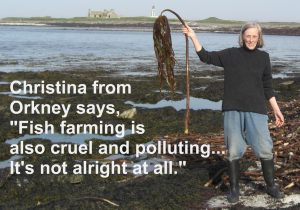By Eve Mitchell
 I asked for it, and I got it. Lucky me!
I asked for it, and I got it. Lucky me!
I asked people all over the UK what they think about factory farming. From Orkney to the Isle of Wight, you’ve got stories. Some of them are sad, and some of them are wise, but all of them show why we need to make sure the last factory farm to get planning permission really was the last factory farm.
Too cruel
We’re known the world over as a nation of animal lovers, and boy did you tell me that rules out meat factories. Christina from Orkney tells it like it is: “Factory farming is cruel; really cruel.”
Eva from Cambridge knows it’s also about respect for the animals. She says, “Their lives are very short compared with the lives of their wild counterparts. If we take their lives at an early age, the least we can do is give them a good life while it lasts.”
Bad for your health
The conditions on factory farms bring all kinds of problems. As Richard from the Isle of Wight points out, “Disease spreads quickly in large groups of animals and in monoculture, and yet this is the way farming is going.” Christina reminds us, “The reason why antibiotics are routinely fed is because of high density stocking rates, which result in the substantially increased likelihood of disease due to stress.” It’s true, which is why we’re fighting for sensible bans on routine farm antibiotic use right across the EU – watch this space.
Eva links this back to our own wellbeing: “There are two reasons why I never buy meat, poultry, fish, eggs or milk products that come from factory farms or fish farms: the health and welfare of the animals is substandard, and my health would be substandard if I ate the compromised quality of the food these animals produce.” Christina from Orkney agrees that factory farms are “unhealthy both for consumers and our planet”.
Environmental mess = economic dead end
Richard knows how it all ties together. “In decades past, before the rise in technology and the pharmaceutical companies, farms were managed to ensure that not only would there be a harvest for this year but for all years that follow, for centuries. Keeping the soils fertile and the environment in balance was the key. Now the land is farmed for profit for today and the soils, livestock and the environment pay the price, followed quickly by the health of the population fed by those farms.”
Richard goes on: “Small farmers with their higher costs are rapidly going to the wall…In our local area in 1969 there were some 315 dairy farms all part of their local community and employing the services of many small businesses such as machinery suppliers and repairers, veterinary surgeons, delivery drivers, feed and seed merchants, the list is endless. Now in 2016 less than 15 dairy farms survive.”
That’s so sad. We love our countryside, and we need to fight for the rural communities that keep it alive. Sadly our government has a lot to learn.
Don’t forget the fish!
Christina up in Orkney knows, “Fish farming is also cruel and polluting…It’s not alright at all.” Fish farms are just factory farms at sea – they don’t bring jobs, but they do bring trouble. They’ve got to go.
We can fix it
Christina says, “Factory farms should be phased out asap…Tinkering isn’t any good at all. It needs a fundamental rethink.” I couldn’t agree more.
Our own attitudes need to change, too, as Christina reminds us: “Meat, eggs, salmon/trout need to be far more expensive.”
Richard says, “Small farms are the answer to food security and to the potential to increase production because they can better utilise the different soils and individual needs of livestock.” They also bring more jobs and keep more money in local communities.
Nita from London knows you can play your part no matter where you live. She says, “I search out products very carefully and appreciate that food is labelled and products that are organic are so much more widely available, even in large supermarkets. People have many more informed choices nowadays.”
Happy endings
Alison from LuckyHens Rescue in Wigan does a very cool thing. She told me, “We have now saved 17,631 hens that would have otherwise been turned into pet food. When the families collect the hens it shocks them but educates them. These girls go off to families as pets but 99% of the time will provide some eggs to feed the families to prevent them having to buy commercial layed eggs.” Happy hens, happy families, real food. What’s not to love?
We absolutely can stop factory farming in the UK. When we work together, support each other and spread the word, big victories do happen.
Have you got a story about factory farming in the UK? I’d love to hear it – and I’d really love to see your pictures. Have your say now.


